|
|
|
Sort Order |
|
|
|
Items / Page
|
|
|
|
|
|
|
| Srl | Item |
| 1 |
ID:
109936
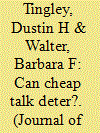

|
|
|
|
|
| Publication |
2011.
|
| Summary/Abstract |
What effect does cheap talk have on behavior in an entry-deterrence game? We shed light on this question using incentivized laboratory experiments of the strategic interaction between defenders and potential entrants. Our results suggest that cheap talk can have a substantial impact on the behavior of both the target and the speaker. By sending costless threats to potential entrants, defenders are able to deter opponents in early periods of play. Moreover, after issuing threats, defenders become more eager to fight. We offer a number of different explanations for this behavior. These results bring fresh evidence about the potential importance of costless verbal communication to the field of international relations.
|
|
|
|
|
|
|
|
|
|
|
|
|
|
|
|
| 2 |
ID:
103892


|
|
|
|
|
| Publication |
2011.
|
| Summary/Abstract |
What effect does repeated play have on reputation building? The literature on international relations remains divided on whether, when, and how reputation matters in both interstate and intrastate conflict. We examine reputation building through a series of incentivized laboratory experiments. Using comparative statics from a repeated entry-deterrence game, we isolate how incentives for reputation building should change as the number of entrants changes. We find that subjects in our experiments generally build reputations and that those investments pay off, but we also find that some subjects did not react to incentives to build reputation in ways our model had predicted. In order to explain this, we focus on the heterogeneity of preferences and cognitive abilities that may exist in any population. Our research suggests that rational-choice scholars of international relations and those using more psychologically based explanations have more common ground than previously articulated.
|
|
|
|
|
|
|
|
|
|
|
|
|
|
|
|
| 3 |
ID:
128867
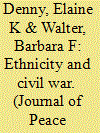

|
|
|
|
|
| Publication |
2014.
|
| Summary/Abstract |
If a civil war begins, it is more likely to be initiated by an ethnic group than any other type of group. We argue that ethnic groups, on average, are likely to have more grievances against the state, are likely to have an easier time organizing support and mobilizing a movement, and are more likely to face difficult-to-resolve bargaining problems. We further argue that each of these factors was likely due to three pre-existing patterns associated with ethnicity. First, when political power is divided along ethnic lines, ruling elites can disproportionately favor their own ethnic group at the expense of others. This creates grievances that fall along ethnic lines. Second, ethnic groups tend to live together in concentrated spaces, sharing the same language and customs, and enjoying deep ties with ethnic kin. This means that ethnic groups, if they are aggrieved, will have an easier time mobilizing support to demand change. Third, the fact that ethnic identity tends to be less elastic than other types of identity means that credible commitments to any bargain - before and during a conflict- will be more difficult to make. The result is that ethnic groups will have a greater number of reasons, opportunities, and incentives to mobilize and fight than non-ethnic groups.
|
|
|
|
|
|
|
|
|
|
|
|
|
|
|
|
| 4 |
ID:
155880


|
|
|
|
|
| Summary/Abstract |
The number of radical Islamist groups fighting in civil wars in Muslim countries has steadily grown over the last twenty years, with such groups outlasting and outperforming more moderate groups. By 2016, Salafi jihadist groups accounted for most of the militant groups in Syria and half of such groups in Somalia. In Iraq, a third of all militant groups were composed of Salafi jihadists. Many analysts argue that the rise of these groups reflects an increase in radical beliefs in Muslim societies. Under certain conditions, however, rebel leaders have strong incentives to embrace an extreme ideology even if they do not believe the ideas that underlie it. When competition is high, information is poor, and institutional constraints are weak, an extremist ideology can help rebel leaders overcome difficult collective-action, principal-agent, and commitment problems. All three of these conditions have been present in the post-2003 civil wars in the Middle East and Africa, and all help explain the emergence and growth of radical groups such as the Islamic State and al-Qaida.
|
|
|
|
|
|
|
|
|
|
|
|
|
|
|
|
| 5 |
ID:
124398
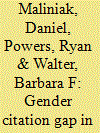

|
|
|
|
|
| Publication |
2013.
|
| Summary/Abstract |
This article investigates the extent to which citation and publication patterns differ between men and women in the international relations (IR) literature. Using data from the Teaching, Research, and International Policy project on peer-reviewed publications between 1980 and 2006, we show that women are systematically cited less than men after controlling for a large number of variables including year of publication, venue of publication, substantive focus, theoretical perspective, methodology, tenure status, and institutional affiliation. These results are robust to a variety of modeling choices. We then turn to network analysis to investigate the extent to which the gender of an article's author affects that article's relative centrality in the network of citations between papers in our sample. Articles authored by women are systematically less central than articles authored by men, all else equal. This is likely because (1) women tend to cite themselves less than men, and (2) men (who make up a disproportionate share of IR scholars) tend to cite men more than women. This is the first study in political science to reveal significant gender differences in citation patterns and is especially meaningful because citation counts are increasingly used as a key measure of research's quality and impact.
|
|
|
|
|
|
|
|
|
|
|
|
|
|
|
|
| 6 |
ID:
070095


|
|
|
| 7 |
ID:
093305
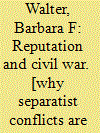

|
|
|
|
|
| Publication |
Cambridge, Cambridge University Press, 2009.
|
| Description |
xiv, 255p.
|
| Standard Number |
9780521763523
|
|
|
|
|
|
|
|
|
|
|
|
Copies: C:1/I:0,R:0,Q:0
Circulation
| Accession# | Call# | Current Location | Status | Policy | Location |
| 054704 | 303.64/WAL 054704 | Main | On Shelf | General | |
|
|
|
|
| 8 |
ID:
073825
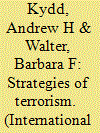

|
|
|
|
|
| Publication |
2006.
|
| Summary/Abstract |
Terrorism is designed to change minds by destroying bodies; it is a form of costly signaling. Terrorists employ five primary strategies of costly signaling: attrition, intimidation, provocation, spoiling, and outbidding. The main targets of persuasion are the enemy and the population that the terrorists hope to represent or control. Terrorists wish to signal that they have the strength and will to impose costs on those who oppose them, and that the enemy and moderate groups on the terrorists' side cannot be trusted and should not be supported. Each strategy works well under certain conditions and poorly under others. State responses to one strategy may be inappropriate for other strategies. In some cases, however, terrorists are pursuing a combination of strategies, and the response must also work well against this combination.
|
|
|
|
|
|
|
|
|
|
|
|
|
|
|
|
| 9 |
ID:
071919
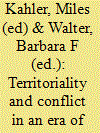

|
|
|
|
|
| Publication |
Cambridge, Cambridge University Press, 2006.
|
| Description |
xii, 340p.
|
| Standard Number |
0521675030
|
|
|
|
|
|
|
|
|
|
|
|
Copies: C:1/I:0,R:0,Q:0
Circulation
| Accession# | Call# | Current Location | Status | Policy | Location |
| 051263 | 341.42/KAH 051263 | Main | On Shelf | General | |
|
|
|
|
| 10 |
ID:
141707


|
|
|
|
|
| Summary/Abstract |
Most contemporary civil wars are now recurrences of earlier civil wars. In contrast to classic theories of grievance and opportunity, this article advances a theory of civil war recurrence that highlights the critical role political and legal institutions play in constraining elites in post–civil war states. Such constraints serve as a check on executive power, help incumbent elites credibly commit to political reform, and create a situation where rebels need not maintain militias as a supplementary mechanism to hold political elites in line. All of this reduces the odds of repeat civil war. Using a statistical analysis of post-conflict years, this article demonstrates that strong political institutions are not only significantly and negatively related to repeat civil war but are the primary determinants of whether countries get caught in the conflict trap.
|
|
|
|
|
|
|
|
|
|
|
|
|
|
|
|
|
|
|
|
|